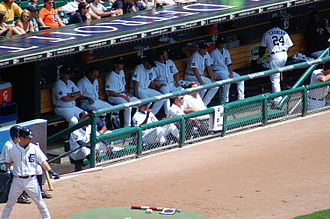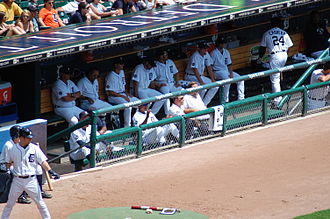
You were once the best player on your team, but now you've leveled up. With a higher talent pool, you've got to win your starting spot.
Obviously, coaches expect players to develop their skills and physicality to earn their positions. However, other qualities can set players apart from the rest. If a player can master these five habits, he'll be well on his way to becoming the smartest player in the dugout—and win his spot on the roster.
1. Make Every Game a Chess Match
The smartest player in the dugout thinks four moves ahead.
He tries to anticipate what the coach might do on offense and defense. After the game, he respectfully asks the coach his motivations and strategy behind decisions. His baseball IQ improves all the while.
Even though he's on the bench, he's absorbing knowledge just by sitting next to the coach. And he wins the coach's trust.
2. Anticipate Jumping In the Game
The smartest player in the dugout visualizes himself in every situation.
He looks for opportunities he could be put into the game. Alert to the game situation, he anticipates his involvement. He takes pride in being a team player—staying ready and prepared.
For example, it's a 4 to 3 game count, and he's betting coach will probably want to bunt. His slow-running teammate next up to bat, but he knows he has better speed. He knows the signal to bunt, the steal sign, and the pitcher's speed to the home plate. If he bunts down the 3B line, he's got a good chance to score a run.
He visualizes himself in position to go on the field at any moment. Coach wants to play ready players into the game, so he anticipates his moment.
3. Understand the Pitcher
The smartest player in the dugout studies the pitcher.
He sees how the pitcher throws to players on his ability level. He's ready for it, noticing his habits.
Ask yourself these questions:
- How does he throw to the best hitter?
- How does he throw to hitters similar to you?
- Does he throw the majority of his pitches inside?
- Does he always start with a fastball or curve ball on the first pitch?
When he gets the chance to face up to the pitcher, he already know the pitcher's pace, tempo, and pick to first. Observing the pitcher's tendencies and making himself a valuable asset to his team, as a hitter and team player, he gains advantageous insight to compete.
4. Be an Asset: Study the Opposition's Strengths and Weaknesses
The smartest player in the dugout observes the opposition.
Picking up every tell and cue, he alerts himself for opportunities as an asset to his team—gaining his coach's trust. His value as a player increases when he pick up signs from opposing coaches.
Watch opponents in pre-game:
- Weak arm in the left? We can take an extra base.
- Slow third-baseman? We can bunt.
- Catcher has a strong arm? It'll be hard to steal.
Head on a swivel, always looking for opportune advantages. He earns trust in his gamesmanship and arms yourself with more opportunities. Champions add up all the little observations over time.
5. Stay Physically Ready To Contribute
Being the smartest player means physically preparing throughout the game.
Here's a few ways to stay warm and ready:
- Play catch with outfielder.
- Stretch throughout the game.
- Swing the bat in between innings.






Leave a Comment